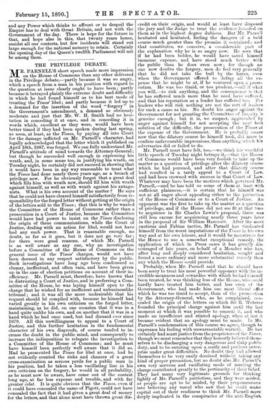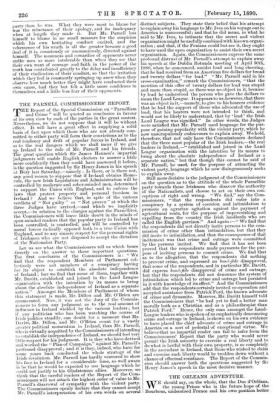THE PRIVILEGE DEBATE.
MR. PARNELL'S short speech made more impression on the House of Commons than any other delivered in the Privilege debate,—partly because it was so angry, which a speech from a man in his position with regard to the question at issue clearly ought to have been ; partly because it betrayed plainly the extreme doubt and difficulty in which he had found himself as to his best mode of treating the Times' libel; and partly because it led up to a demand for the insertion of the word " forgery " in the Government's amendment, a demand so obviously moderate and just that Mr. W. H. Smith had no hesi- tation in conceding it at once, and in conceding it in words which, excellent as they were, would have been better timed if they had been spoken during last spring, as soon, at least, as the Times, by paying ..e2 into Court for the damage inflicted on Mr. Parnell's character, had legally acknowledged that the letter which it published on April 18th, 1887, was forged. We can fully understand Mr. Parnell's attitude of mind towards the Attorney-General; but though he succeeded well enough in expressing his wrath, and, in some sense too, in justifying his wrath, on Tuesday night, he certainly did not succeed in showing that it would have been in any way reasonable to treat what the Times had done nearly three years ago, as a breach of privilege now. For he obviously forgot that a great deal which fills him with wrath now, should fill him with wrath against himself, as well as with wrath against his antago- nists. What is his own account of the matter ? He says that he could not have cleared himself satisfactorily from re- sponsibility for the forged letter without getting at the origin of the letters sold to the Times; that this is why he wanted the Committee of the House of Commons rather than a prosecution in a Court of Justice, because the Committee would have had power to insist on the Times disclosing the origin of these communications, while the Court of Justice, dealing with an action for libel, would not have had any such power. That is reasonable enough, no doubt, so far as it goes, but it does not go very far ; for there were good reasons, of which Mr. Parnell is as well aware as any one, why an investigation before a Committee of the House of Commons on the general issue of the Times' charges, would not have been deemed in any respect satisfactory by the public. Such investigations have long ago been condemned as clumsy, ineffectual, and often vain, and have been given up in the case of election petitions on account of their in- efficiency. Mr. Parnell must, therefore, have known that in distrusting a Court of Justice, and in preferring a Com- mittee of the House, he was laying himself open to the charge that he wished for an inefficient and. unbusinesslike tribunal ; and it was all the more undesirable that his request should be complied with, because he himself had varied greatly in his own criticism on the forged letter, maintaining, as he did, on one occasion that it was in a hand quite unlike his own, and on another that it was in a hand which he had once used, but had disused ever since 1879. All this unwillingness to appeal to a Court of Justice, and this further hesitation in the fundamental character of his own disproofs, of course tended to in- crease the doubt in the public mind, and consequently to increase the indisposition to relegate the investigation to a Committee of the House of Commons ; and he must have himself been perfectly well aware that it did so. Had he prosecuted the Times for libel at once, had he not evidently counted. the risks and chances of a great cross-examination as serious perils for a public man in his position, had he taken a less vacillating line in his own criticism on the forgery, he would in all probability, as he must now be aware, have come out of the contest long ago, at far less expense and trouble, and with far greater éclat. It is quite obvious that the Times, even if it could have concealed the name of Pigott, could. not have concealed the fact that it had given a great deal of money for the letters, and that alone must have thrown great dis- credit on their origin, and would at least have disposed the jury and the Judge to treat the evidence founded on them as in the highest degree dubious. But Mr. Parnell hesitated and hesitated, feeling the dangers of a bold course much greater than the promise it contained ; and that constitutes, we conceive, a considerable part of the explanation why he is so angry now. He sees that if he had been bolder, he would have saved himself immense expense, and have stood much better with the public than he does even now ; for though no one now doubts the forgery, men do feel very generally that he did not take the bull by the horns, even when the Government offered to defray all the ex- pense that he might be at, if he ventured upon a prose- cution. He was too timid, or too prudent,—call it what you will,—to risk anything, and the consequence is that he has suffered much more than he need have suffered, and that his reputation as a leader has suffered too. For leaders who will risk nothing are not the sort of leaders for such a cause as his. No doubt his anger against the Government for not granting the Committee of Inquiry is genuine enough ; but it is, we suspect, aggravated by auger against himself for not accepting the net best solution of the difficulty, the prosecution of the Times at the expense of the Government. He is probably aware now that the dilatory course he himself took, did more to confirm unfavourable impressions, than anything which his adversaries did or failed to do.
Mr. Parnell must have felt, too,—we think his wrathful little speeeh of Tuesday night betrays it,—that the House of Commons would have been very foolish to take up the matter as a question of privilege after the dilatory course which he had pursued, and after that dilatory course had. resulted in a tardy appeal to a Court of Law, and. had been crowned with success in that Court of Law. Whatever may have been the motives which governed Mr. Parnell,—and. he has told us some of them at least with sufficient plainness,—it is certain that he himself was not at all eager about appealing either to the protection of the House of Commons or to a Court of Justice. An opponent was the first to take up the matter as a question of privilege, and. if the House did not see fit at that time to acquiesce in Sir Charles Lewis's proposal, there was still less excuse for acquiescing nearly three years later in the proposal of Sir William Harcourt. After the most cautious and Fabian tactics, Mr. Parnell has vindicated himself from the worst imputations of the Times in his own way and at his own leisure, and it would be monstrous for the House to use a somewhat exceptional remedy, the application of which in Press cases it has greatly dis- couraged of late years, oa behalf of a Member who has, after long and deeply considered. hesitation, sought and found a more ordinary and more substantial remedy than any which the House could provide.
Probably, when Mr. Parnell said. that he should have been sorry to treat his most powerful opponent with the in- credible meanness and cowardice with which be had himself been treated, he was thinking less of the House, who could hardly have treated him better, and less even of the Government, who had made him one most liberal offer which he was too timid. to accept, than of the prosecution by the Attorney-General, who, as he complained, con- cealed the origin of the letters on which Sir R. Webster founded the principal charge against him until the last moment at which it was possible to conceal it, and who made an insufficient and stinted apology, when at last it became evident that an apology must be made. In Mr. Parnell's condemnation of this course we agree, though he expresses his feeling with unwarrantable warmth. He has certainly had scant justice from the proprietors of the Times, though we must remember that they honestly believed them- selves to be discharging a very dangerous and risky public duty, and to be entering upon a costly and perilous enter- prise under great difficulties. No doubt they had allowed themselves to be very easily deceived without taking any kind of proper precaution, but no doubt also Mr. Parnell's own very nervous and vacillating mode of meeting the charge contributed greatly to the pertinacity of their belief. They had many very legitimate grounds for thinking lightly of Mr. Parnell's patriotism, and they were misled, as people are apt to be misled, by their prepossessions into believing any rascal who saw that he could make capital out of their readiness to think Mr. Parnell more deeply implicated in the conspiracies of the anti-English party than he was. What they were most to blame for was the reluctance of their apology, and its inadequacy when at length they made it. But Mr. Parnell has himself to blame in no small measure for the suspicion which his own hesitating conduct excited, and the vehemence of his wrath is all the greater because a good deal of it is, consciously or unconsciously, directed against himself. The meanness and cowardice of opponents never strike men as more intolerable than when they see that their own want of courage and faith in the power of the truth has contributed greatly to the delay and insufficiency of their vindication of their conduct, so that the irritation which they feel is constantly springing up anew when they observe how much better they might have conducted their own cause, had they but felt a little more confidence in themselves and a little less fear of their opponents.



































 Previous page
Previous page